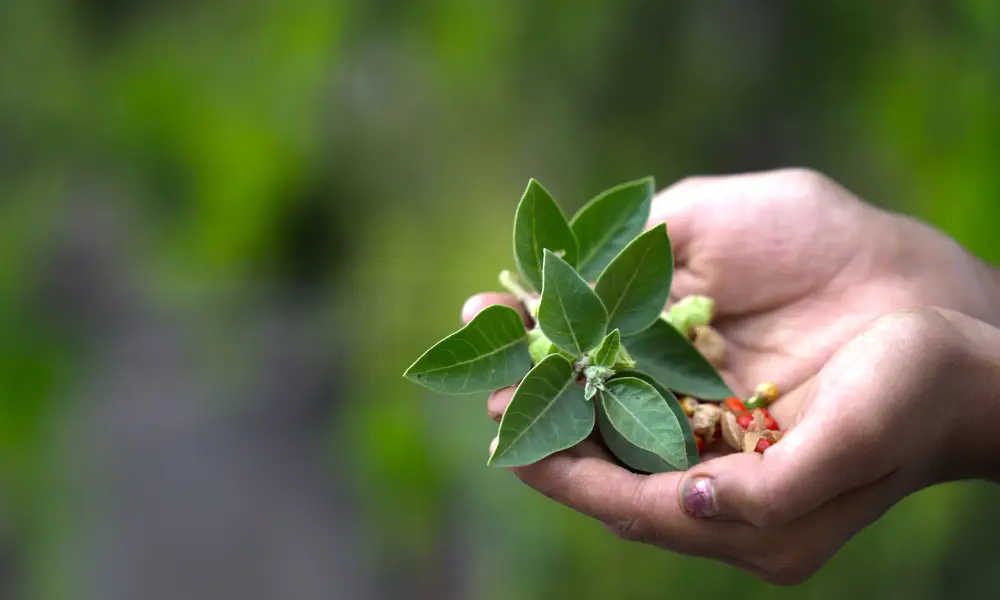PCOD, or Polycystic Ovary Syndrome, is a prevalent hormonal disorder affecting a significant number of women globally. Characterized by irregular periods, cysts on the ovaries, and hormonal imbalances, PCOD often poses challenges in conventional treatment approaches. This article explores the alternative realm of Ayurveda and how it offers a comprehensive approach to PCOD treatment in Ayurveda.
Contents
Understanding PCOD 
PCOD stands for Polycystic Ovary Syndrome, which is a common hormonal disorder that affects people with ovaries. It is also sometimes referred to as Polycystic Ovarian Syndrome (PCOS). In PCOD, there is an imbalance in reproductive hormones, leading to various symptoms and potential complications.
The key features of PCOD include:
- Irregular Menstrual Cycles: Women with PCOD often experience irregular or infrequent menstrual periods.
- Ovulatory Dysfunction: The normal process of ovulation, where the ovary releases an egg each month, may be disrupted in PCOD.
- Hyperandrogenism: Elevated levels of androgens (male hormones) can lead to symptoms such as acne, excess facial and body hair (hirsutism), and male-pattern baldness.
- Polycystic Ovaries: The ovaries may contain small fluid-filled sacs (cysts) that surround the eggs, but these cysts are not true cysts. Instead, they are follicles that have not developed properly.
- Insulin Resistance: Some individuals with PCOD may have insulin resistance, which can contribute to weight gain and difficulty in maintaining a healthy weight.
- Metabolic Issues: PCOD is associated with an increased risk of developing metabolic conditions such as type 2 diabetes and cardiovascular disease.
The exact cause of PCOD is not fully understood, but both genetic and environmental factors are believed to play a role. While there is no cure for PCOD, various treatments are available to manage its symptoms and reduce the risk of complications. These may include lifestyle changes, medications, and, in some cases, assisted reproductive technologies for those experiencing fertility issues. It’s important for individuals with PCOD to work closely with healthcare providers to address their specific symptoms and concerns.
Limitations Of Conventional Treatments Of PCOD
The conventional treatments for Polycystic Ovary Syndrome (PCOS) come with certain limitations:
- Symptomatic Treatment: Conventional treatments primarily focus on managing symptoms rather than addressing the root cause of PCOS. Medications like birth control pills can regulate menstrual cycles and reduce symptoms like acne or hirsutism, but they do not cure the condition.
- Temporary Relief: While medications may provide temporary relief from some symptoms, they often do not offer a permanent solution. Symptoms may return when the medication is discontinued, especially in cases where lifestyle factors are not adequately addressed.
- Side Effects: Some medications used to manage PCOS symptoms, such as hormonal contraceptives or anti-androgen drugs, can have side effects. These side effects may include nausea, weight gain, mood changes, and a potential increased risk of blood clots.
- Fertility Challenges: Conventional treatments may not effectively address fertility issues associated with PCOS. While medications like Clomiphene may be prescribed to induce ovulation, they may not be successful for all individuals, and assisted reproductive technologies might be needed for those struggling with infertility.
- Lifestyle Factors: Lifestyle modifications, such as diet and exercise, are often recommended as part of PCOS management. However, adherence to these lifestyle changes can be challenging for some individuals, and conventional treatments may not adequately address these aspects.
- Individual Variation: PCOS is a heterogeneous condition, and what works for one person may not be as effective for another. Conventional treatments may need to be tailored to each individual’s specific symptoms and needs.
- Long-Term Management: PCOS is a chronic condition, and conventional treatments may require long-term use. It’s essential for individuals to work closely with healthcare providers to monitor and manage symptoms over time.
What Is Ayurveda? 
Ayurveda is a traditional system of medicine that has its roots in ancient India. The word “Ayurveda” is derived from the Sanskrit words “Ayur,” meaning life, and “Veda,” meaning knowledge or science. Therefore, Ayurveda can be translated as the “science of life” or the “knowledge of life.”
Key principles of Ayurveda include:
- Doshas: Ayurveda categorizes individuals into three doshas—Vata, Pitta, and Kapha—which represent different combinations of the five elements (earth, water, fire, air, and ether) believed to exist in the human body. The balance of these doshas is considered crucial for maintaining good health.
- Prakriti: Each person is believed to have a unique constitution or Prakriti, which is determined by the dominant dosha or combination of doshas. Understanding one’s Prakriti helps in tailoring lifestyle, diet, and therapeutic approaches for maintaining balance and preventing illness.
- Dhatus and Malas: Ayurveda describes seven bodily tissues (Dhatus) and waste products (Malas) that must be balanced for optimal health. These include elements such as plasma, blood, muscles, fat, bones, and reproductive tissues.
- Agni: Agni refers to the digestive fire, and it plays a crucial role in the metabolism and assimilation of nutrients. A balanced Agni is essential for overall well-being.
- Ayurvedic Treatments: Ayurveda employs a holistic approach to health, emphasizing the balance of mind, body, and spirit. Treatments may include herbal remedies, dietary recommendations, lifestyle modifications, massage therapies (like Abhyanga), meditation, and yoga.
- Panchakarma: Panchakarma is a set of cleansing and detoxification procedures used in Ayurveda to eliminate toxins from the body. It includes therapies such as Vamana (emesis), Virechana (purgation), Basti (enema), Nasya (nasal administration), and Raktamokshana (bloodletting).
- Preventive Healthcare: Ayurveda places a strong emphasis on preventive healthcare. Maintaining a balance in daily routines, seasonal adjustments, and dietary habits are considered essential for preventing illness.
Ayurvedic Treatments And Approaches For PCOD
Ayurvedic treatments for Polycystic Ovary Syndrome (PCOS) focus on balancing the doshas (Vata, Pitta, and Kapha), improving overall well-being, and addressing specific symptoms associated with PCOD. It’s important to note that Ayurvedic treatments are individualized, and recommendations may vary based on a person’s unique constitution (Prakriti) and the specific imbalances present. Here are some commonly recommended Ayurvedic treatments for PCOD:
Dietary Recommendations
- Ayurveda emphasizes a balanced diet to maintain harmony among the doshas. Dietary recommendations for PCOD often include avoiding Kapha-aggravating foods, such as heavy and oily foods, and incorporating warm, light, and easily digestible meals.
- Specific herbs and spices with anti-inflammatory properties, such as turmeric, ginger, and cinnamon, may be included in the diet.
Herbal Remedies
- Ayurvedic herbs are commonly used to address hormonal imbalances and support reproductive health.
- Shatavari (Asparagus racemosus): Known for its hormonal balancing properties and support for the female reproductive system.
- Guggulu (Commiphora wightii): Believed to have anti-inflammatory effects and support in managing metabolic imbalances.
- Triphala: A combination of three fruits (amla, bibhitaki, and haritaki) used for detoxification and promoting digestive health.
- Ashwagandha (Withania somnifera): Known for its adaptogenic properties, helping the body cope with stress.
Lifestyle Modifications
- Establishing a regular daily routine (dinacharya) is emphasized in Ayurveda. This includes consistent wake-up times, meals, and bedtime to support overall balance.
- Regular exercise, particularly activities that balance Vata and Kapha, is recommended. Practices like yoga and meditation can also help manage stress.
Panchakarma
- Panchakarma, a set of Ayurvedic detoxification procedures, may be recommended to eliminate toxins (ama) from the body.
- Basti (medicated enema): Often used to balance Vata dosha and support reproductive health.
Yoga and Meditation
- Specific yoga poses and pranayama (breathing exercises) that support hormonal balance and reduce stress may be recommended.
- Mind-body practices, such as meditation, can help manage stress, which is often a contributing factor in PCOD.
Ayurvedic Massages
Abhyanga, or Ayurvedic oil massage, is believed to improve circulation, reduce stress, and promote overall well-being.
Ayurvedic Formulations
Ayurvedic practitioners may recommend specific formulations tailored to an individual’s constitution and symptoms. These formulations may include a combination of herbs and minerals.
It’s important to approach Ayurvedic treatments for PCOD under the guidance of a qualified Ayurvedic practitioner. Additionally, individuals should inform their primary healthcare providers about any Ayurvedic treatments being pursued to ensure coordinated and comprehensive care. Ayurveda, when used in conjunction with conventional medical care, can offer a holistic approach to managing PCOD.
Lifestyle Changes For PCOD Management 
Lifestyle changes play a crucial role in the management of Polycystic Ovary Syndrome (PCOS). These changes aim to address underlying factors such as insulin resistance, hormonal imbalances, and lifestyle-related issues. Here are some lifestyle recommendations for managing PCOS:
- Healthy Diet
- Balanced Nutrition: Focus on a well-balanced diet that includes a variety of whole foods such as fruits, vegetables, whole grains, lean proteins, and healthy fats.
- Low Glycemic Index (GI) Foods: Choose foods with a low glycemic index to help manage insulin levels. This includes whole grains, legumes, and non-starchy vegetables.
- Regular Exercise
- Aerobic Exercise: Engage in regular aerobic exercises like brisk walking, jogging, cycling, or swimming. Aim for at least 150 minutes of moderate-intensity exercise per week.
- Strength Training: Include strength training exercises to improve muscle mass and metabolism.
- Maintain a Healthy Weight
- Achieving and maintaining a healthy weight can help regulate menstrual cycles, improve insulin sensitivity, and reduce symptoms associated with PCOS.
- Hydration
- Stay adequately hydrated by drinking plenty of water throughout the day. Proper hydration supports overall health and may aid in weight management.
- Regular Sleep Patterns
- Establish a consistent sleep routine with a sufficient duration of sleep each night. Poor sleep can contribute to hormonal imbalances and exacerbate PCOS symptoms.
- Stress Management
- Practice stress-reducing techniques such as yoga, meditation, deep breathing exercises, or mindfulness. Chronic stress can impact hormone levels and worsen PCOS symptoms.
- Limit Processed Foods and Sugar
- Reduce the consumption of highly processed foods, sugary snacks, and beverages. Opt for whole, nutrient-dense foods to support overall health.
- Fiber-Rich Foods
- Include fibre-rich foods in your diet, such as fruits, vegetables, and whole grains. Fibre can help regulate blood sugar levels and promote digestive health.





